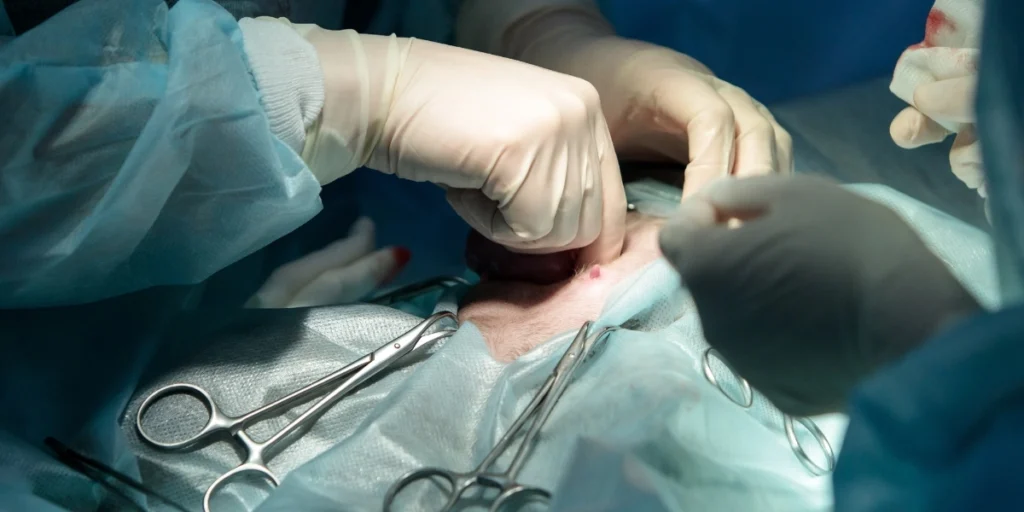
Experience the highest standard of care for ureteropelvic junction obstruction with Dr. I R Ravish, the Best Urologist in Bangalore. Specializing in both open and minimally invasive laparoscopic pyeloplasty, Dr. Ravish ensures precise, effective treatment with advanced surgical techniques. Trust our expertise for comprehensive preoperative assessment, meticulous surgical procedures, and dedicated postoperative care, all aimed at delivering the best outcomes and enhancing your quality of life.
Overview
Preoperative Phase
Surgical Procedure
Postoperative Care
Why Choose Us
Pyeloplasty Surgery is a specialized procedure aimed at correcting ureteropelvic junction (UPJ) obstruction. This condition involves a blockage at the junction where the ureter meets the renal pelvis, hindering the normal flow of urine from the kidney to the bladder. This obstruction can lead to severe pain, recurrent urinary tract infections, and even kidney damage if left untreated. Pyeloplasty Surgery is a definitive solution to restore normal urine flow and prevent further complications.
There are two primary approaches to Pyeloplasty Surgery: open and laparoscopic. Both methods are designed to achieve the same goal—relief of the obstruction and restoration of normal kidney function—but they differ in their techniques and recovery processes.
Pyeloplasty Surgery is indicated for patients with confirmed UPJ obstruction that causes symptoms or poses a risk to kidney function. Common indications include:
Undergoing Pyeloplasty Surgery provides numerous benefits, including:
As with any surgical procedure, Pyeloplasty Surgery carries certain risks. These include infection, bleeding, and complications related to anesthesia. However, these risks are relatively low, especially when performed by an experienced surgeon in the field of Surgical Urology.
Postoperative care is crucial for a successful recovery. Patients will need to follow specific instructions regarding wound care, activity restrictions, and follow-up visits. Regular monitoring ensures that the ureter heals properly and that normal kidney function is restored. Pyeloplasty Surgery, whether performed as an open or laparoscopic procedure, is a vital intervention for addressing UPJ obstruction.
The preoperative phase for Pyeloplasty Surgery is a crucial step to ensure the success of the procedure and the overall well-being of the patient. This phase involves several essential steps, including medical evaluation, diagnostic testing, patient preparation, and pre-surgery counseling.
A comprehensive medical evaluation is the first step in the preoperative phase for Pyeloplasty Surgery. This involves a detailed review of the patient’s medical history, including any previous surgeries, current medications, and allergies. The Best Urologist in Bangalore conducts a thorough physical examination to assess the patient’s overall health and identify any potential risks that may affect the surgery.
Diagnostic testing is vital to confirm the presence and severity of the ureteropelvic junction (UPJ) obstruction. The following tests are typically performed during the preoperative phase:
These diagnostic tests enable the surgical team to plan the most effective approach for Pyeloplasty Surgery, whether open or laparoscopic.
Preparing the patient for Pyeloplasty Surgery involves several important steps to ensure a smooth and successful operation.
Pre-surgery counseling is an integral part of the preoperative phase, providing patients with detailed information about the Pyeloplasty Surgery procedure, potential risks, and expected outcomes.
This comprehensive preparation ensures the best possible outcomes and a smoother recovery process.
Pyeloplasty Surgery is a critical intervention designed to correct ureteropelvic junction (UPJ) obstruction, which hampers the flow of urine from the kidney to the bladder. The surgical procedure can be executed through two primary methods: open surgery and laparoscopic surgery. Both techniques aim to alleviate the obstruction and restore normal urine flow, thus preserving kidney function and preventing further complications.
Open Pyeloplasty Surgery involves making a larger incision in the patient’s side to access the kidney and ureter directly. This traditional approach is often chosen for complex cases or when other medical conditions may complicate the laparoscopic method. During the surgery, the surgeon excises the obstructed segment of the ureter and reconnects the healthy portions to ensure unobstructed urine flow. The surgery is performed under general anesthesia, ensuring the patient is entirely unconscious and pain-free during the procedure.
Laparoscopic Pyeloplasty Surgery, on the other hand, utilizes minimally invasive techniques. Small incisions are made to insert a laparoscope—a thin tube with a camera—and surgical instruments. The laparoscope provides a magnified view of the internal organs on a monitor, allowing the surgeon to operate with precision. This method generally results in less postoperative pain and faster recovery compared to open surgery.
Laparoscopic Pyeloplasty Surgery offers several benefits, including:
Postoperative care is crucial to the success of Pyeloplasty Surgery. Patients need to follow specific guidelines to ensure optimal recovery:
Postoperative care is a critical phase following Pyeloplasty Surgery, ensuring optimal recovery and long-term success. Proper care after surgery helps minimize complications, promotes healing, and facilitates a return to normal activities. Here, we outline the key aspects of postoperative care, including immediate postoperative management, home care, and follow-up visits.
Immediately after Pyeloplasty Surgery, patients are closely monitored in the recovery room. The focus during this phase is to ensure that anesthesia effects wear off safely and to manage any immediate postoperative pain or discomfort. Patients might feel some pain and will be provided with medications to manage it effectively. Nurses and doctors will check vital signs, such as blood pressure, heart rate, and oxygen levels, to ensure stability. Any drainage tubes or urinary catheters placed during surgery are also monitored and managed during this period.
Once stable, patients are discharged with detailed home care instructions to ensure a smooth recovery process. These instructions typically include:
Regular follow-up visits are essential to monitor the healing process and ensure the success of the Pyeloplasty Surgery. During these visits, the doctor will:
Even after the initial recovery period, long-term care and monitoring may be necessary to ensure the continued success of Pyeloplasty Surgery. This includes periodic check-ups to assess kidney function and detect any potential issues early. Maintaining a healthy lifestyle with proper hydration and avoiding factors that could lead to urinary obstructions are important aspects of long-term care.
When it comes to Pyeloplasty Surgery, expertise is paramount. Our team of highly skilled urologists has extensive experience in performing both open and laparoscopic pyeloplasty procedures. This depth of knowledge ensures that patients receive the most advanced and effective treatments available. Each member of our surgical team is dedicated to continuous learning and staying abreast of the latest advancements in Surgical Urology, allowing us to offer the best possible outcomes for our patients.
We believe that personalized patient care is essential to successful treatment outcomes. Our approach involves comprehensive preoperative evaluations to tailor the surgical plan to each individual’s specific needs. From the initial consultation to postoperative follow-ups, our patients are supported every step of the way. This personalized attention helps to alleviate anxiety and ensures that every patient fully understands their treatment plan and recovery process.
Our commitment to utilizing advanced surgical techniques sets us apart. We offer both open and laparoscopic options for Pyeloplasty Surgery, allowing us to choose the best method based on the patient’s condition and preferences. Laparoscopic pyeloplasty, in particular, offers the benefits of minimally invasive surgery, including reduced postoperative pain and faster recovery times. Our surgeons are proficient in these techniques, ensuring that patients receive cutting-edge care.
Postoperative care is crucial for a successful recovery. We provide thorough postoperative support to ensure that our patients recover safely and comfortably. This support includes detailed postoperative instructions, regular follow-up appointments, and easy access to our team for any questions or concerns that may arise during the recovery period.
Our comprehensive approach to postoperative care is designed to facilitate a smooth and swift recovery, reducing the risk of complications and enhancing overall patient satisfaction.
Choosing us means choosing excellence in patient outcomes. Our focus on providing top-tier care through expertise, advanced techniques, personalized attention, and comprehensive support leads to superior results. Patients benefit from our commitment to achieving the best possible outcomes, reflected in our high success rates and patient satisfaction scores. By entrusting your care to the best urologist in Bangalore, you can be confident in receiving the highest standard of Surgical Urology care.
While pyeloplasty is generally safe, potential risks include infection, bleeding, and injury to surrounding organs. However, choosing an experienced surgeon like Dr. I R Ravish significantly reduces these risks and ensures a successful outcome.
Recovery times can vary, but most patients can return to their normal activities within 2-4 weeks after laparoscopic surgery. Open surgery may require a longer recovery period. Dr. I R Ravish provides detailed postoperative care instructions to facilitate a smooth recovery.
Laparoscopic pyeloplasty offers numerous benefits, including smaller incisions, less postoperative pain, shorter hospital stays, and faster recovery. This minimally invasive approach, performed by the Best Urosurgeon, ensures optimal outcomes with minimal discomfort.
Copyright © 2024 Best Urologist. All rights reserved.
© Designed and Developed By Cloudstar Digital
